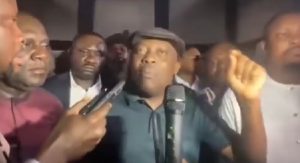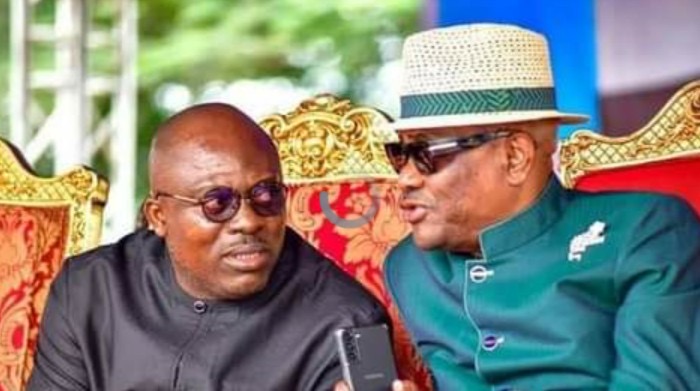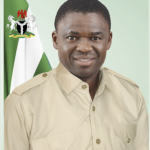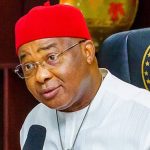By Emmanuel Spencer
Monday, October 30, 2023 was one heck of a day for residents of Port Harcourt and the people of Rivers State. While they were still trying to wriggle out of the puzzle surrounding the bombing of the State house of Assembly complex, a chain of events that would forever change the political story of the State was happening very fast.
The erstwhile united House of Assembly had split into two and had elected two factional speakers. One of the factions had issued an impeachment notice o the governor, while the other had suspended the chief judge of the state.
By the time people realised what was going on, they were saying that they did not know dirty open fight between the immediate past Governor of Rivers State, Chief Nyesom Wike, and his successor and political godson, Mr. Siminalayi Fubara, would come this fast, but they knew it going to happen.
Fubara, an accountant was unknown, politically, before Nyesom Wike, became the Governor of Rivers State. It is not clear what qualities Fubara exhibited before Wike took notice of him. But within a short time of Fubara working as a finance officer in Government House, Wike had promoted him to the position Director of Finance, Government House.
By the time Wike was elected governor for the second time, he moved Fubara from being Director of Finance in Government House to become the Accountant-General of the state, way ahead of many of his seniors in the senior service. The two of them worked very closely together to the envy of other close aides of the former governor and top civil servants.
Fubara had his best of times rising very fast within 20 years to the top of his civil service career. At some point, many people began to speculate that there was a family relationship between the two of them even though Wike, an Ikwerre, hails from Rumuepirikom in Obio Akpor Local Government Area and Fubara, an Ijaw hails from Opobo in Opobo/Nkoro Local Government Area. People could not understand the unusual attraction between them.
Fubara was Wike’s most trusted aide and when Wike’s government began to execute high cost projects like the flyovers, it was Fubara that oversaw the financing. He controlled the huge internally generated revenues running into over 15 billion a month and the federal allocations due the oil rich state. He also handled the huge cash withdrawals, which Wike needed to keep out of the banking system to execute his political agenda, especially the presidential primaries.
The Economic and Financial Crimes Commission (EFCC) at one point declared Fubara wanted for allegedly withdrawing the sum of N117 billion cash from the banks prior to the 2022 primaries. Wike used his office to provide cover for Fubara, who several times had to go underground to avoid being arrested by the EFCC. It was said that if there was anyone that knew the financial secrets of Wike, it must be Fubara.

So it was not a surprise when Wike fought off all the top contenders for the Peoples Democratic Party (PDP) politicians that wanted to succeed him. He then made it clear that it was either Fubara or no one else. Many powerful godfathers prepare their successors, and Wike had the right to also prepare one for himself. But why Fubara, a civil servant? Wike ensured that even while still serving as a civil servant, Fubara was nominated the governorship candidate of the PDP. Fubara continued to serve as Accountant General and resigned only 30 days to the governorship election in March 2022, where he was elected the governor of Rivers State.

Being elected Governor could have served two vital purposes. One was to cover the hind of Wike, whose financial recklessness had been called to question many times. The immediate past governors always needed someone that was part of their financial dealings to be in charge to protect their name and cover their records. Two, allowing Fubara to become a free citizen could get him easily into the nets of the anti-graft agencies, who could grill him to reveal the questionable financial dealings Wike made during his tenure. Governors in Nigeria enjoy immunity from criminal prosecution until the end of their tenures. So, as governor, Fubara would be free from the web of EFCC and co.
That was the way the two were until the governorship baton was passed on between them on May 29, 2023. Given the way Wike closely guarded Fubara, the media was worried that Fubra woul turn out to be puppet on who Wike could be pulling the strings. They were also concerned that their relationship was too close that they would easily fall out. But Wike dismissed such fears, saying he would have nothing to do with the governance of the state after leaving office.
He recalled in one of those interviews with several TV networks how virtually every former governor that installed their successor had fallen out with their successors, and that he would be foolish to think he would control the governor that would succeed him.
He lied. The night after Fubara was inaugurated, all the governors’ first appointees were nominated by Wike. The Chief of Staff to the Governor, the Government House Camp Commander, the Secretary to the State Government, the Commissioner for Finance, the Attorney General of the State and the Head of Service.
The principal officers of the House of Assembly were Wike’s protégés, especially the speaker, Mr. Martin Amaewhule, who was Wike’s kinsman from Obio/Akpor. All these were seen by observers as a way of building a ring around Fubara should he try to play smart with Wike.
Everything seemed to have been perfectly laid out for a smooth relationship between Wike and Fubara before Wike moved to Abuja to take up duties as the Minister of the Federal Capital Territory (FCT). What it meant was that Fubara had to clear from Abuja about everything he had to do in Port Harcourt before going public. It affected the appointment of principal officers of government like commissioners, whose appointments had to be cleared. Being a very busy minister in Abuja meant that Governor Fubara had to wait for hours and even days on end to see Wike in Abuja or on the few occasions he came to Port Harcourt. Besides, the close aides of the governor who were working for Wike would not cooperate with Fubara if he wanted to take actions without clearing from Wike.
Soon, the long distance between Wike and Fubara began to create problems. Fubara began to take actions and decisions that derogated Wike. Such decisions as the promotion and payment of promotion benefits to civil servants, which Wike sat on for the eight years that he was governor; the rehabilitation of the secretariat complex, which was also abandoned by Wike and the recruitment of thousands of young graduates into the civil service and cancelled employments into the Ignatius Ajuru University of Education, that favoured only Wike’s kinsfolk. And remarkably, Fubara began to revisit agricultural and industrial projects that Wike abandoned like the Songhai Farms. As these moves by Fuabra were attracting commendations for Fubara, they were rubbing mud on Wike, who was considered to have failed in those areas.
Sources very close to Government House also began to talk about the frustrations that the governor was going through in raising funds to pay for government services and projects. The sources said Wike had mortgaged most of the revenues and tied them to personal purposes such that Fubara literally had to go cap in hand looking for funds. Some other sources alleged that Wike had made a demand on Fubara to set aside from the state’s revenues a huge fund amounting to billions of naira for him every month, and that Fubara had begun to express his frustrations.
That was the state of affairs when rumours hit town last weekend that a plan had been hatched to impeach Fubara. The plot, it was said was to first remove the Majority Leader, Edison Ehie, who had become an ardent loyalist of Fubara and then move on to impeach Fubara.
People were still ruminating on this rumour when on Sunday night the story of the bombing of the House of Assembly complex spread in the media.
What initially appeared to be mere speculations had become real when on Monday, as security agents took over the road leading to the House of Assembly. Thousands of youths sympathetic to Fubara joined him as he marched from Government House to the House of Assembly where he was attacked with water by the police formation at the complex. Fubara even alleged that he saw the Deputy Commissioner of Police shoot at him directly with the intention of killing him.
Fubara asked those wanting to impeach him to show justification for their action. “The truth is that everybody who knows me know that i am a peaceful person,” saying he could not have been part of the destruction of the House of Assembly complex.
Rivers State Council of Elders led by Henry Aguma and Mike Lube asked Wike to “allow Sim Fubara to breathe”.
Similarly, Rivers State Indigenous NGOs and Civil Society Network led by Tombari Dumka-Kote asked the feuding parties to “sheathe their swords and give peace a chance in the interest of the state and wellbeing citizens.”
Former Commissioner for Information on the state, Ibim Semenitari, was rather cautious saying, “It is one Rivers State , One People under God.”
Meanwhile, members of the House of Assembly loyal to Wike had met very early, removed Ehie as the Majority Leader and passed a resolution to serve an impeachment notice of Fubara. Elsewhere, members of the hosue loyal to Fubara also met, impeached the speaker, Martin Amaewhule and elected Ehie as the new speaker. The faction of the house also passed a resolution suspending the Chief Judge of the State and advising the governor to appoint a new chief judge.
The entire developments created huge confusion I the state. Even the leadership of the ruling PDP was caught off balance. The Chairman of the party, Ambassador Desmond Akawor and his executive did not know where to turn. In a statement, they called for restraint from both the executive and the legislature. The statement said party elders were being consulted to resolve the impasse.
Some Ijaw leaders condemned the attempt to remove the governor and Ijaw person, saying it was all a plot to return the Ikwerre to power in Rivers State. The Ijaw group in Leader of the Niger Delta, Chief Edwin Clark, who said he was “greatly disturbed by the develo0pments in Port Harcourt,” accused Wike of masterminding the developments so that he could get the speaker, who is his kinsman to become governor. He therefore called on President Bola Tinubu to call Wike to order.
The governorship of Rivers State has always created tension between the upland and riverine peoples of the state. Since 1999 when the country returned to democratic rule, the upland communities had produced the governors. They are Peter odili (1999 – 2007), Celestine Omehia (2007), Rotimi Amaechi (2007 – 2015) and Nyesom Wike (2015 – 2023). It was only this year that a riverine governor in the person of Fubara emerged. It is one reason why many riverine people have seen the recent effort to remove Fubara as a ploy to deny the riverine people the only chance they have got to be governor.
Calm returned to Port Harcourt on Tuesday after the Monday turbulence. Repoirts from Abuja said both Fubara and Wike were seen in Aso Rock, Abuja where President Tinubu had summoned them. Whatever would be the outcome of the meeting and other interventions, one matter is clear. Things are not going to be the same again between Wike and his political godson, Fubara. One Port Harcourt resident, said, “It is the beginning of the liberation of Rivers State from a one-man dictatorship.”









Leave a Reply